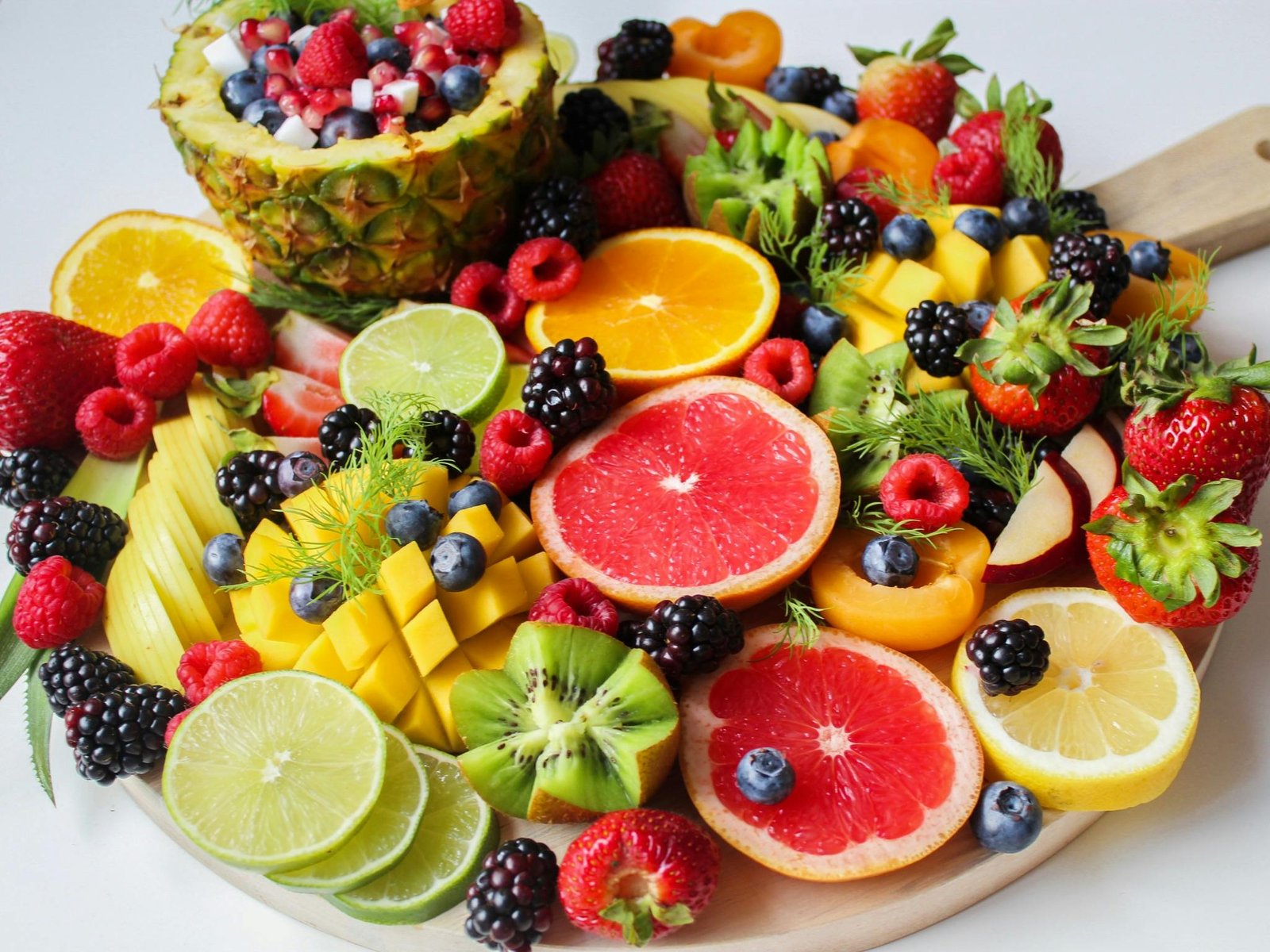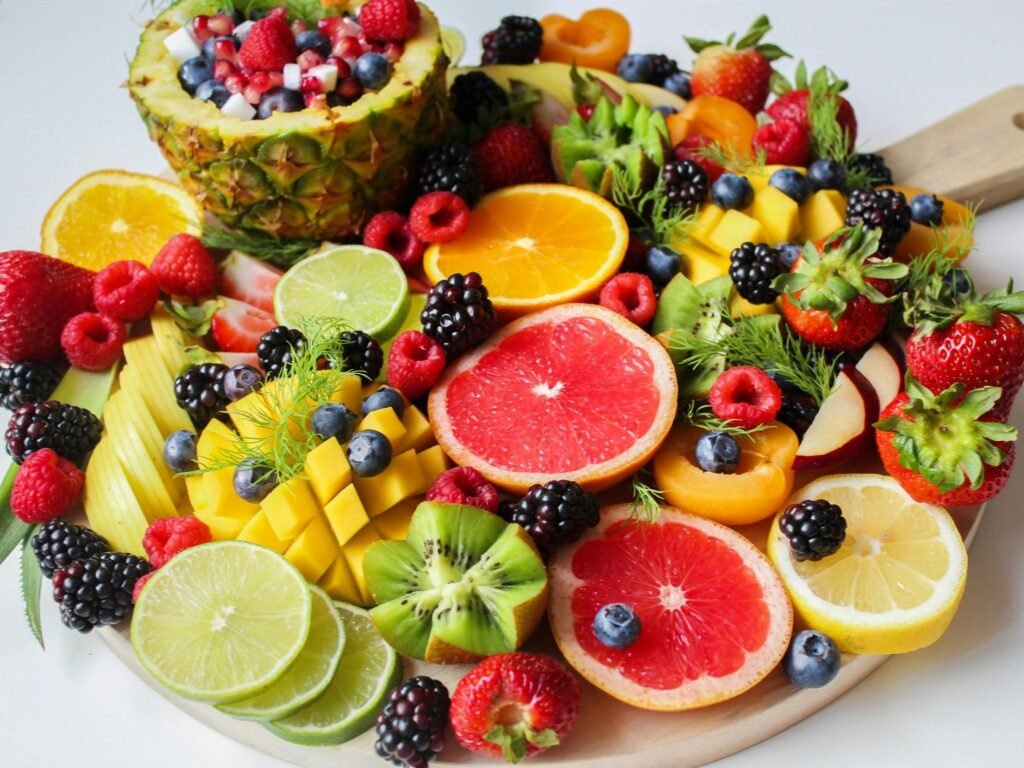
Seasonal fruits offer numerous health benefits as they are naturally packed with essential vitamins, minerals, and antioxidants that support overall well-being. Consuming fruits in their natural season ensures maximum freshness, flavor, and nutritional value, as they are grown in optimal conditions without excessive preservatives or artificial ripening agents. These fruits help strengthen the immune system, improve digestion, and promote heart health Get the Fresh Fruits fill your requirement drop your need,due to their rich fiber content and high levels of vitamin C, potassium, and other vital nutrients. Additionally, seasonal fruits are often more hydrating, aiding in detoxification and maintaining healthy skin. Their abundance of natural antioxidants helps fight free radicals, reducing the risk of chronic diseases such as diabetes, hypertension, and cancer. Eating fruits according to the season also supports sustainable farming, reducing the carbon footprint by minimizing transportation and storage requirements. Incorporating a variety of seasonal fruits into your diet not only enhances physical health but also supports mental well-being by providing essential nutrients that regulate mood and cognitive function.
Winter Fruits (December–February)
- Oranges, Lemons, and Grapefruits – High in vitamin C, boost immunity, and improve skin health.
- Pomegranates – Rich in antioxidants, good for heart health, and helps with blood circulation.
- Apples – High in fiber, aids digestion, and helps in weight management.
- Guavas – Excellent source of vitamin C, strengthens immunity, and improves skin texture.
- Kiwi – Loaded with vitamins C and K, supports digestion and boosts immunity.
Spring Fruits (March–May)
- Strawberries – Rich in antioxidants, promotes heart health, and good for skin.
- Pineapple – Aids digestion, supports bone health, and has anti-inflammatory properties.
- Mangoes – High in vitamin A, good for eyesight, and supports the immune system.
- Cherries – Help reduce inflammation, improve sleep, and are rich in antioxidants.
Summer Fruits (June–August)
- Watermelon – Keeps the body hydrated, good for skin, and rich in lycopene for heart health.
- Muskmelon (Cantaloupe) – Supports hydration, boosts immunity, and improves digestion.
- Litchi – Rich in vitamin C, improves blood circulation, and boosts immunity.
- Papaya – Aids digestion, rich in enzymes, and supports skin and hair health.
- Peaches – High in fiber, supports digestion, and promotes skin health.
Autumn Fruits (September–November)
- Grapes – Rich in antioxidants, supports heart health, and improves blood circulation.
- Figs – Good for digestion, rich in calcium, and supports bone health.
- Pears – High in fiber, good for gut health, and helps regulate blood sugar levels.
- Persimmons – Rich in vitamin A, supports eye health, and improves digestion
Why We Eat Fruits for Managing and Comparing Body Weight

Introduction
Fruits have been an essential part of human diets for centuries. They are packed with essential vitamins, minerals, antioxidants, and fiber, making them a healthy choice for maintaining overall well-being. When it comes to body weight management and comparison, fruits play a vital role due to their low calorie, high nutrient density, and ability to promote satiety. This article explores why consuming fruits is beneficial for weight control and how they influence body weight in comparison to other foods.
Nutrient-Dense but Low in Calories
One of the primary reasons fruits are recommended for managing body weight is their nutrient density. Unlike processed foods that contain high amounts of empty calories, fruits provide essential nutrients without excessive calorie intake. Most fruits contain a significant amount of water, which contributes to their low-calorie count while keeping you hydrated and feeling full.
For example:
- An apple contains approximately 95 calories but is rich in fiber and vitamins.
- A banana provides around 105 calories but is an excellent source of potassium and energy.
- Strawberries contain only 32 calories per 100 grams, making them a great snack for weight management.
High Fiber Content for Satiety
Dietary fiber is crucial for weight control, and fruits are a great source of both soluble and insoluble fiber. Fiber slows digestion, making you feel full for longer and reducing overall food intake. Soluble fiber, found in apples, pears, and citrus fruits, forms a gel-like substance in the stomach that helps regulate blood sugar levels and prevents overeating. Insoluble fiber, found in berries and bananas, aids digestion and supports gut health.
Studies have shown that diets rich in fiber help reduce appetite and lead to a natural reduction in calorie consumption, ultimately supporting weight management.
Natural Sugars vs. Processed Sugars
A common misconception is that fruits contain too much sugar, making them unsuitable for weight loss. However, the natural sugars found in fruits (fructose) are vastly different from refined sugars found in processed foods. Natural sugars are accompanied by fiber, water, and essential nutrients, which slow down sugar absorption and prevent blood sugar spikes.
In contrast, processed sugars found in candies, sodas, and baked goods contribute to weight gain by increasing cravings, leading to overconsumption of calories. Fruits offer a healthier way to satisfy sweet cravings without the harmful effects of refined sugar.
Fruits and Metabolism Boost
Certain fruits have metabolism-boosting properties, which can help with fat loss and weight control. For example:
- Grapefruit: Contains enzymes that help burn fat and reduce insulin levels.
- Berries: Packed with antioxidants that enhance metabolism and reduce fat storage.
- Apples and pears: High in fiber and water content, promoting weight loss by increasing fullness.
- Pineapple: Contains bromelain, an enzyme that aids digestion and reduces bloating.
By incorporating metabolism-boosting fruits into your diet, you can support your body’s ability to burn calories efficiently.
Hydration and Detoxification
Fruits have high water content, which aids in hydration and detoxification. Proper hydration is essential for digestion, metabolism, and maintaining a healthy body weight. Fruits such as watermelon, cucumbers, oranges, and grapes provide natural hydration and help flush out toxins from the body, preventing water retention and bloating.
Moreover, the antioxidants and phytonutrients in fruits combat oxidative stress and inflammation, further supporting weight management by reducing stress-related weight gain.
Comparing Fruits with Other Food Groups
When comparing body weight management strategies, it is essential to analyze how fruits measure up against other food groups:
- Fruits vs. Processed Snacks: Processed snacks like chips and cookies are high in unhealthy fats, sugar, and preservatives, leading to weight gain. In contrast, fruits are natural, fiber-rich, and low in calories, making them a better alternative.
- Fruits vs. Sugary Beverages: Soft drinks and artificial juices contain added sugars that contribute to obesity. Fresh fruit or homemade smoothies provide natural sweetness without unnecessary calories.
- Fruits vs. Proteins and Fats: While protein and healthy fats are necessary for muscle building and satiety, excessive consumption can lead to weight gain. Fruits balance the diet by providing essential vitamins and fiber while keeping calorie intake in check.
The Role of Fruits in Different Diet Plans
Many diet plans incorporate fruits as a staple for weight management. Here’s how different diets use fruits to promote weight control:
- Keto Diet: Low-carb fruits like berries and avocados are included in moderation.
- Mediterranean Diet: Fruits like figs, oranges, and grapes are consumed along with whole foods and healthy fats.
- Vegan and Plant-Based Diets: Fruits serve as a primary source of energy and nutrients.
- Intermittent Fasting: Fruits are often included during eating windows for quick and efficient nutrition.
Best Fruits for Weight Management
Although all fruits have health benefits, some are particularly effective for weight control:
- Apples – High in fiber and low in calories, keeping you full longer.
- Berries – Loaded with antioxidants and low in sugar.
- Grapefruit – Helps regulate insulin levels and aids fat loss.
- Watermelon – Hydrating and low in calories.
- Papaya – Aids digestion and reduces bloating.
- Pears – High in fiber and water content, reducing hunger cravings.
- Oranges – Low in calories and packed with vitamin C.
- Kiwi – Helps improve digestion and metabolism.
FAQ
Q: Can eating too much fruit cause weight gain?
A: While fruits are healthy, consuming them in excessive amounts, especially high-sugar fruits like bananas and mangoes, may contribute to increased calorie intake.
Q: Which fruits should I avoid for weight loss?
A: Fruits with high natural sugar content, such as grapes, lychee, and mangoes, should be eaten in moderation when trying to lose weight.
Q: How many servings of fruit should I eat daily for weight management?
A: It is recommended to consume 2-4 servings of fruit daily as part of a balanced diet.
Q: Can fruit juices be a substitute for whole fruits?
A: Whole fruits are preferable as they contain fiber, whereas fruit juices often lack fiber and may have added sugars.
If you stop eating food, your body will go through several stages of deterioration, which can impact both your health and productivity—especially in fast-paced industries like digital marketing and e-commerce, where energy and focus are crucial.
Short-Term Effects (1-3 Days):
- Low Energy & Fatigue – Your body starts using stored glycogen for energy, making you feel sluggish.
- Dehydration Risk – Many foods contain water, so not eating can lead to dehydration, affecting concentration (which is critical for running marketing campaigns and tracking analytics).
Mid-Term Effects (3-7 Days):
- Muscle Loss & Weakness – Your body starts breaking down muscle for energy, which reduces overall strength.
- Irritability & Brain Fog – Lack of food impacts brain function, which could make strategic decision-making for branding or performance marketing more challenging.
Long-Term Effects (Weeks & Beyond):
- Weakened Immune System – Without essential nutrients, you’re more prone to illnesses.
- Organ Damage – The body starts shutting down non-essential functions to preserve energy, which can become life-threatening.
tay Updated Every Time: The Importance of Keeping Up with Marketing News
In today’s fast-paced digital world, staying updated with marketing news is essential for businesses, marketers, and entrepreneurs. The marketing landscape is constantly evolving, with new trends, strategies, and technologies emerging almost daily. Whether it’s the latest algorithm update from Google, a new social media platform feature, or shifting consumer behavior, being informed helps businesses stay competitive and adapt their strategies accordingly.
Why Staying Updated with Marketing News is Essential
- Adapting to Industry Changes: Marketing trends change rapidly. What worked a year ago might not be effective today. By staying updated, businesses can adjust their strategies and take advantage of new opportunities, such as emerging social media platforms or innovative advertising techniques.
- Understanding Consumer Behavior: Consumer preferences shift over time. Keeping track of marketing news helps businesses understand these changes and tailor their messaging and product offerings to meet the evolving needs of their audience.
- Leveraging New Technologies: Artificial intelligence (AI), automation, and data analytics are transforming marketing. Staying updated allows businesses to leverage these technologies for better targeting, personalization, and efficiency in their campaigns.
- Competitive Advantage: Knowledge is power in marketing. Brands that stay informed are more likely to outpace competitors by implementing the latest strategies, optimizing campaigns, and reaching audiences more effectively.
Best Ways to Stay Updated with Marketing News
- Follow Reputable Marketing Blogs & Websites: Websites like HubSpot, Marketing Land, Moz, and Neil Patel’s blog provide valuable insights on the latest marketing trends and updates. Subscribing to their newsletters ensures you receive information directly in your inbox.
- Listen to Marketing Podcasts: Podcasts such as “Marketing Over Coffee,” “The Digital Marketing Podcast,” and “Social Media Marketing Podcast” offer convenient ways to stay updated while commuting or working.
- Join Industry Forums and Communities: Engaging in online communities like Reddit’s r/marketing, GrowthHackers, and LinkedIn groups helps marketers discuss trends, share insights, and stay informed about the latest industry changes.
- Subscribe to Newsletters and Email Alerts: Many marketing platforms offer email subscriptions that provide daily or weekly updates on the latest marketing trends, research, and case studies.
- Attend Webinars and Conferences: Virtual and in-person events hosted by organizations like Google, Facebook, and major digital marketing agencies provide first-hand knowledge about new tools, strategies, and industry shifts.
- Follow Industry Leaders on Social Media: Experts like Gary Vaynerchuk, Seth Godin, and Rand Fishkin frequently share insights, predictions, and updates on platforms like Twitter, LinkedIn, and YouTube.
- Monitor Google Algorithm Updates: SEO is a crucial part of digital marketing, and Google frequently updates its algorithms. Keeping an eye on Google’s official blog and SEO-related sources ensures you stay ahead of changes that can impact search rankings.




